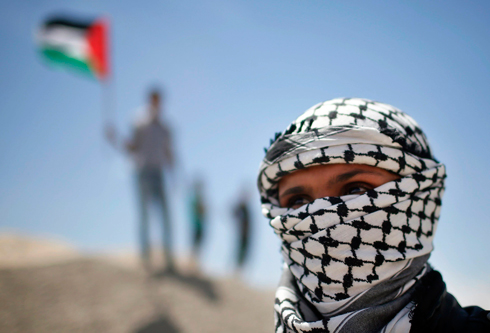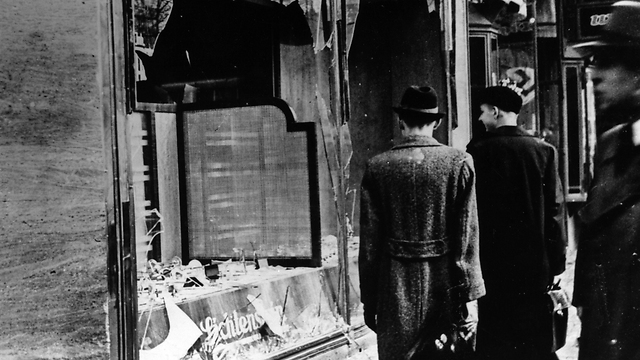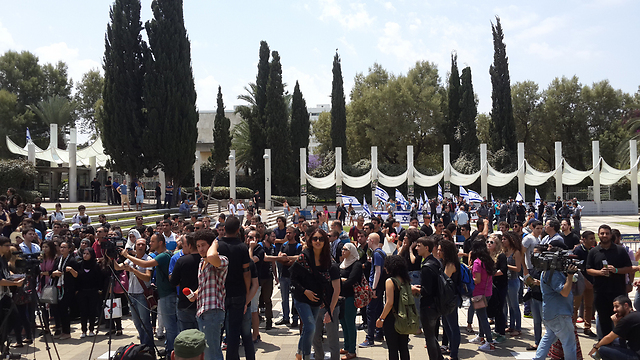From Ynet Nws, 28 Nov 2014, by Dror ben Yemini:
Op-ed: For decades, the Palestinians have nurtured the ethos of the Nakba while Israel chose to downplay the persecutions and expulsion of the Arab Jews. It is time to set the record straight.
"If the Jewish state becomes a fact, and this is realized by the Arab peoples, they will drive the Jews who live in their midst into the sea."
This statement was made by Hassan al-Banna, the founder of the Muslim Brotherhood, about a month and a half after the declaration of the independence, and with the Egyptian Army already having invaded the territory allotted to the Jewish state.
The Mufti, Haj Amin al-Husseini, explained in his memoirs:
"Our fundamental condition for cooperating with Germany was a free hand to eradicate every last Jew from Palestine and the Arab world."
And the Arab League at the time also adopted two decisions, which materialized into a bill designed to seize the bank accounts of Jews and strip them of their possessions – a bill that was subsequently put into practice among well-established and wealthy Jewish communities in places such as Egypt, Libya, Syria and Iraq. Entire communities were destroyed.
For decades, the Palestinians have nurtured the ethos of the Nakba. It has become the defining experience of Palestinian identity. Israel, on the other hand, chose to downplay the persecutions, expulsion and dispossession of the Jews of the Arab states.
 Palestinians mark Nakba Day in Gaza Strip
Palestinians mark Nakba Day in Gaza Strip
(Photo: Reuters)
The Knesset decided only this year to set aside a special day, November 30, to mark the Jewish Nakba. Most school children in Israel know about what was done to the Jews of Kishinev and also about what was done to the Arabs in Deir Yassin.
But most Israeli students don't know about Jewish Nakba. They don't know about a long series of pogroms and massacres perpetrated against Jews in most Arab countries. The Kishinev pogroms in 1906 claimed the lives of 29 Jews. A year later, in pogroms in Morocco, 50 Jews were murdered in the city of Settat, and another 30 were killed in Casablanca.
How many high school students know about them? And how many know about the pogrom in Aden in 1948 in which 82 Jews were murdered? And how many know about the hundreds more who were killed during that period in Iraq, Egypt, Syria and Libya only because they were Jews?
The "narratives" have taken control of the university campuses and school system. On their behalf, Israeli students are told "the other side's version of the story." Not that one should belittle the pain of the Palestinians. God forbid. The thing is that there is nothing unique about the Palestinian story in particular. People fled. Some were deported too. But where were things any different?
And yet, the Jewish Nakba vanished into thin air, despite the fact that it was far more severe. After all, the Jews of the Arab states didn't declare war on the Arab countries; they didn't have a leader like the Mufti who was planning and plotting to eradicate all the Arabs – every last one. On the contrary, they were peaceful citizens wherever they were.
* * *
Let's set the record straight. The disintegration of the empires, beginning with the Ottoman, through to the Austro-Hungarian, and on to the British, intensified the demand on the part of various peoples for self-determination – no more multi-ethnic states under imperial rule, but nations with a sense of independent identity instead. Some would call it an imaginary heritage, but that's not important.
The result was huge waves of population transfers, beginning in 1912 and through to the years following World War II. Around 52 million people underwent the experience, including tens of millions in the period after the war.
Millions of Germans, Hungarians, Poles, Ukrainians, Turks, Greeks, Bulgarians, Romanians, Indians, Pakistanis and more and more were forced to leave their birthplaces to make way for national entities, old and new. One would be hard pressed to find a single conflict during the period in question that did not end without a population exchange.
 Remains of shop attacked on Kristallnacht
Remains of shop attacked on Kristallnacht
(Photo: Gettyimages)
And the same happened in the Jewish-Arab conflict too. When the Peel Commission decided in 1937 on a population exchange, one of the reasons it offered to support its decision was the fact that the Iraqis had carried out against the Assyrian minority, despite earlier assurances to safeguard their rights.
The population exchanges between Greece and Turkey also served as a backdrop for the commission's decision. At the time, this was the position held by statesmen, scholars and intellectuals. Furthermore, in 1930, the Permanent Court of International Justice, the highest international judicial instance at the time, approved population transfers by force when it ruled that the purpose of mass population transfers was to "more effectively aid the process of pacification of the Near East."
* * *
That's the background. The Arabs of Palestine paid a price for two reasons – firstly, because of the recalcitrant and reckless actions of their leaders; and secondly, as mentioned, because that's the way things worked during that period.
It wouldn't have happened without the big Arab invasion, which was accompanied by declarations of destruction from Arab leaders, like the Arab League secretary-general at the time, who declared: "This will be a war of extermination and momentous massacre which will be spoken of like the Tartar massacre or the Crusader wars."
The war against the fledgling Jewish state ended in resounding defeat. But among those who paid the price were the hundreds of thousands of Jews in the Arab countries. Take note, not all were expelled; but those who weren't knew, too, that their time was up.
There've been attempts here and there to gauge the value of the Jewish property left behind in Arab states. According to estimates offered by economist Sidney Zabludoff, assets abandoned by Arab refugees amount to $3.9 billion, as opposed to the $6 billion in assets abandoned by Jewish refugees (in 2007 terms). There are other assessments too.
What is clear is the fact that those tens of millions who underwent the experience of population exchanges didn't receive a single penny, and certainly not the "right of return." Just a few years ago, the European Court of Human Rights rejected a property restitution claim filed by Greek refugees from Cyprus.
The Jews of European received compensation because their story is a different one. They were dispossessed through no fault of their own, and not in the framework of population exchanges. Not only that, they are believed to have received just 20 percent of the value of the assets they once possessed. When viewed in the light of the real situation, and not "narratives," the right of the Jews to compensation is far greater than that of the Arabs.
* * *
A ceremony to mark the Jewish Nakba will take place on Sunday at the President's Residence, following the recent enactment of a law designating November 30 as a day to mark the departure and expulsion of Jews from the Arab states and Iran. And the ceremony, in essence, is an expression of our need to recognize the broad picture. We need to know there were huge population exchanges.
 Counter-protest against Nakba rally at Tel Aviv University
Counter-protest against Nakba rally at Tel Aviv University
(Photo: Shahar Hay)
We need to know these huge population exchanges also saw hundreds of thousands of Jews expelled and dispossessed. We need to know that overplaying the Palestinian Nakba – like in the form of the Nakba film festival at the Tel Aviv Cinematheque – has actually become a factor that is holding back the chance for an agreement and understanding, and that recognizing the broad picture will make it clear to all that there's no turning back the clock.
Millions of Indians are not going to go back to Pakistan. Millions of Germans are not going to go back to parts of Poland that were once Germany. Millions of Poles and Ukrainians won't return to Ukraine or Poland. Millions of Palestinians aren't coming back to Israel, and millions of Jews are not going to return to Arab states.
Today, ignoring the broad picture is detrimental to peace. The ceremony that will take place on Sunday at the President's Residence won't change the misguided perceptions, not of the Palestinians and not of parts of the Israeli left.
This can only be achieved through massive investment in the school system – not to teach the Zionist or Palestinian narrative, but to teach instead the truth. Perhaps we've forgotten, but there is such a thing.









